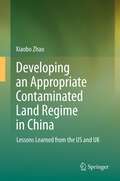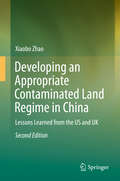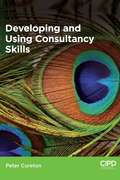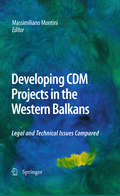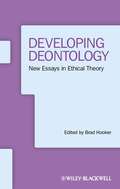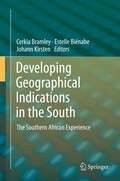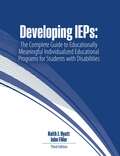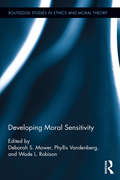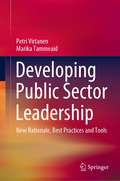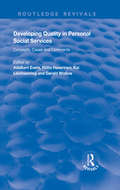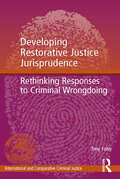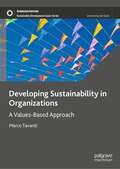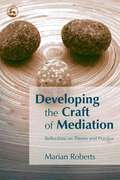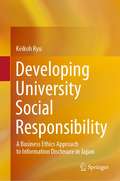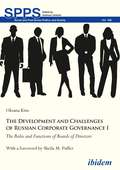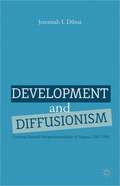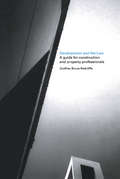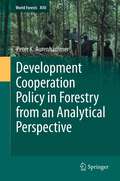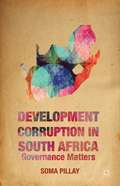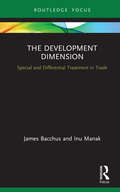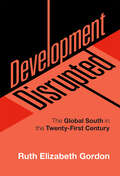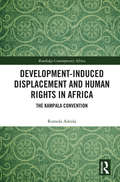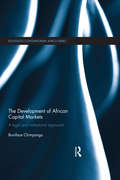- Table View
- List View
Developing an Appropriate Contaminated Land Regime in China
by Xiaobo ZhaoLike all industrialized countries, China has encountered increasing problems with land contamination in recent years. Abandoned mining and manufacturing sites and obsolete industrial complexes, while also creating new polluting industrial enterprises, represent impending environmental threats. More importantly, a number of social and economic problems have developed and must be dealt with, in some cases urgently. Contaminated land laws and regulations have been established and have evolved in the US and UK and many other jurisdictions over the past few decades. These regimes have substantially influenced the relevant legislation in the context of numerous Asian and European countries and will inevitably benefit similar legislative efforts in China. This book is the first monograph that focuses on how China can learn from the US and UK with respect to contaminated land legislation and comprehensively illustrates how contaminated land law could be created in China. It will be of interest to academics and practitioners in environmental law in China, as well as the US and UK.
Developing an Appropriate Contaminated Land Regime in China: Lessons Learned From The Us And Uk
by Xiaobo ZhaoLike all industrialized countries, China has encountered increasing problems with land contamination in recent years. Abandoned mining and manufacturing sites and obsolete industrial complexes, while also creating new polluting industrial enterprises, represent impending environmental threats. More importantly, a number of social and economic problems have developed and must be dealt with, in some cases urgently. Contaminated land laws and regulations have been established and have evolved in the US and UK and many other jurisdictions over the past few decades. These regimes have substantially influenced the relevant legislation in the context of numerous Asian and European countries and will inevitably benefit similar legislative efforts in China. This book is the first monograph that focuses on how China can learn from the US and UK with respect to contaminated land legislation and comprehensively illustrates how contaminated land law could be created in China. It will be of interest to academics and practitioners in environmental law in China, as well as the US and UK.
Developing and Using Consultancy Skills
by Peter John CuretonDeveloping and Using Consultancy Skills supports students and practitioners in their understanding of the meaning of consultancy and the skills required in consulting in a learning and development context. It covers all the stages in the consulting process and provides guidance on engaging with the client, clarifying the nature of the issues, agreeing the research areas and analysing feedback. Developing and Using Consultancy Skills also includes essential coverage of common problems with client-consultation relationships and how to overcome these as well as discussion of ethics and consultant behaviour. Essential reading for anyone studying the intermediate CIPD L&D qualification, this guide will not only equip students for their studies, but also for their role as L&D professionals in the workplace.
Developing CDM Projects in the Western Balkans
by Massimiliano MontiniDeveloping CDM Projects in the Western Balkans: Legal and Technical Issues Compared, arises from the professional practical experience gained by an interdisciplinary team of legal and technical experts acting in the framework of the environmental bilateral cooperation performed by the Italian Ministry for the Environment, Land and Sea in the Western Balkan countries, through the "Task Force for Central and Eastern Europe". The added value of the book consists in the fact that it jointly presents the real professional experience gained by a multi sectoral team of lawyers, economists, engineers and other technical experts, working in synergy with a shared vision. This volume will be useful not only to those specifically interested in the Western Balkan area, but represents a broader example of lessons learned in the development of CDM projects. Therefore, it may have a broad market among Government officials and legal-economic-technical professionals dealing with climate change issues as well as academics developing scientific research in this field.
Developing Countries in the Gatt Legal System
by Robert E. HudecIn this reissued edition of the classic work Developing Countries in the GATT Legal System, Robert E. Hudec's clear insight on the situation of developing countries within the international trade system is once again made available. Hudec is regarded as one of the most prominent commentators on the evolution of the current international trade regime, and this long out-of-print book offers his analysis of the dynamics playing out between developed and developing nations. A significant contribution when the book was first published, this work continues to serve as a thoughtful and important guide to how current and future trade policy must seriously adapt to the demands of the developing world. This new edition includes a new introduction by J. Michael Finger that examines Hudec's work to understand how the GATT got into its current historical-institutional predicament and the lasting impact of his work on current research on international trade systems.
Developing Deontology: New Essays in Ethical Theory (Ratio Special Issues #14)
by Brad HookerDeveloping Deontology consists of six new essays in ethical theory by leading contemporary moral philosophers. Each essay considers concepts prominent in the development of deontological approaches to ethics, and these essays offer an invaluable contribution to that development. Essays are contributed by Michael Smith, Philip Stratton-Lake, Ralph Wedgewood, David Owens, Peter Vallentyne, and Elizabeth Harman - all leading contemporary moral philosophers Each essay offers an original and previously unpublished contribution to the subject A significant addition to the field for anyone with an interest in the development of deontology The collection is edited by a leading philosophical scholar
Developing Geographical Indications in the South: The Southern African Experience
by Cerkia Bramley Estelle Bienabe Johann KirstenThis book contributes to the literature on Geographical Indications (GIs) by providing key theoretical reflections from a five-year review process on the potential of GIs for agri-food products in Southern Africa. The contributors reflect on diverse GI processes and dynamics which operate at the local, national and international levels, thus enriching the understanding of GI dynamics and of the variety of policy options available for GI protection in Southern countries. Following a discussion of the legal framework and governance of national GI schemes in Southern countries, the book emphasizes the main dimensions underlying the development of GIs and their potential for enhancing sustainable rural development and market access in particular. This provides the structure for the chapters that build on the different experiences of Southern African industries that have embarked on GI strategies. The book includes chapters on designing an appropriate legal framework and governance system for the development of GIs in Southern countries.
Developing IEPs: The Complete Guide to Educationally Meaningful Individualized Educational Programs for Students with Disabilities
by Keith J. Hyatt John FillerThis book focuses on the IEP process from both procedural and substantive perspectives as it relates to students from 3 through 21 years of age (information is congruent with the 2017 U. S. Supreme Court decision in Endrew F. v. Douglas County School District). The text stresses the interrelated aspects of IEPs, continuing to mention and discuss its various components as the text progresses. Filled with practical material that readers can immediately apply, Developing IEPs provides a valuable reference that helps students demystify the subject both in and out of the classroom. The Second Edition of Developing IEPs includes: reproducible forms, hyperlinks for important resources, checklists to ensure you develop educationally relevant and legally compliant IEPs, updates on IEP team responsibilities for bullying and harassment, extensive coverage of postsecondary transition planning.
Developing Moral Sensitivity (Routledge Studies in Ethics and Moral Theory)
by Wade L. Robison Deborah Mower Phyllis VandenbergMoral sensitivity affects whether and how we see others, note moral concerns, respond with delicacy, and navigate complex social interactions. Scholars from a variety of fields explore the concept of moral sensitivity and how it develops, beginning with a natural moral capacity for sensitivity towards others that is shaped in a variety of ways through relationships, forms of teaching, and social institutions. Each of these influences alters the capacity as well as one’s responses in complex ways. The concept of moral sensitivity deepens as progressive chapters demonstrate its increasing complexity through development within individuals, over time, as they mature, and as their relationships and social contexts expand. The chapters integrate research from philosophy, psychology, neuroscience, literature, education, and media and technology studies, with key chapters by Darcia Narváez, Nancy E. Snow, Michael S. Pritchard, and Stephen J. Thoma and a Foreword by Owen Flanagan. It is the only comprehensive presentation of interdisciplinary work on moral sensitivity that integrates a theoretical, methodological, and pedagogical analysis. This highly interdisciplinary approach provides a new way of thinking about the relationship of individuals to society and moral sensitivity as a social phenomenon, extending current research in ethics, moral psychology, and psychology toward situated, embodied, and contextual analyses.
Developing Public Sector Leadership: New Rationale, Best Practices and Tools
by Petri Virtanen Marika TammeaidThis book presents tools, techniques, and best practices to develop public-sector leadership. Based on scholarly research as well as the authors’ professional experience as leadership trainers and consultants, it offers guidance and practical know-how for public-sector managers, civil servants and policymakers in public administration on how to create and develop leadership skills and practice. By analyzing the particular nature of political processes and public policy decision-making as well as the complex challenges of public organizations, the authors identify competencies, leadership skills and methods required for successful governance, administration, and management of public organizations. The authors also discuss different leadership styles and philosophies, cover topics such as public sector leadership training of 2020’s, and present case studies on successful public-sector leadership development and future-oriented leadership models. Balancing public-sector leadership theory with practical illustrations and examples, tools and techniques, the book helps managers master the art of public-sector leadership.
Developing Quality in Personal Social Services: Concepts, Cases and Comments (Routledge Revivals)
by Adalbert Evers Riitta Haverinen Kai Leichsenring Gerald WistowFirst published in 1997, this volume is about the challenge of introducing business-originated concepts of quality assurance, personal social services are currently confronted with all over Europe. Undoubtedly, the new orientation towards a more business-like approach in social welfare settings will raise professionalism, "client-orientation" and controlling (instead of mere inspection). There is evidence, however, that the specificities of personal social services are not always taken into account if it comes to introducing market values and mechanisms. Due to this development it becomes essential to promote more adequate criteria for quality standards in the very field of personal social services. The challenge is to maintain a certain standard of service provision while at the same time reconsidering the preconditions for defining quality. This will imply the search for a consensus between allegedly diverging approaches, i.e. between their different basic concepts, aims and standards. Given the social and economic context within which these developments are taking place, the focus of the contributions is on their critical assessment in different European countries. An overview is given about national developments in the areas of care for older persons and other social services. The contributors from Austria, Belgium, Denmark, Finland, Germany, Italy, the Netherlands, Norway, Sweden, and the UK look at how and by whom quality is defined and what challenges the actors of the traditionally mixed economy of personal social services are meeting. Empirical evidence about user involvement and satisfaction is given but also theoretical reasoning about the impact of business approaches on a "pubic good". Thus, the book tries to fill an important gap in practice, research and policy-making concerning personal social services and quality issues.
Developing Restorative Justice Jurisprudence: Rethinking Responses to Criminal Wrongdoing (International and Comparative Criminal Justice)
by Tony FoleyWhat are the requirements for a just response to criminal wrongdoing? Drawing on comparative and empirical analysis of existing models of global practice, this book offers an approach aimed at restricting the current limitations of criminal justice process and addressing the current deficiencies. Putting restoration squarely alongside other aims of justice responses, the author argues that only when restorative questions are taken into account can institutional responses be truly said to be just. Using the three primary jurisdictions of Australia, New Zealand and Canada, the book presents the leading examples of restorative justice practices incorporated in mainstream criminal justice systems from around the world. In conclusion, the work provides a fresh insight into how today’s criminal law might develop in order to bring restoration directly into the mix for tomorrow. This book will be of interest to undergraduates, postgraduate researchers and lecturers, as well as lawyers who work in the field of criminal law, criminologists, social scientists and philosophers interested in ideas of wrongdoing and criminal justice responses to criminal offending.
Developing Sustainability in Organizations: A Values-Based Approach (Sustainable Development Goals Series)
by Marco TavantiThis book explores the historical, foundational, and applied elements of sustainability theory and practice as relevant to the leadership, management, and innovation of organizations, companies and enterprises. It provides analytical and critical reviews of the current evolution of sustainability for people, planet, prosperity, innovation and impact.Divided into four parts, the work offers an integrated model of development for creating and delivering sustainability values at the personal, organizational, societal and environmental levels. The different sections examine sustainability leadership (focusing on of ethics, values, and purpose), sustainability management (focusing on organizational effectiveness and stakeholders’ wellbeing), sustainability innovation (focusing on social and environmental entrepreneurship), and sustainability impact (focusing on resilience, interconnectedness, consciousness, systemic thinking, and cosmic empathy for the common good and common future).Combining theoretical and practical applications that give the reader a deeper, scientific, and critical understanding of the urgent, complex, and necessary values for a sustainable future for all, this comprehensive text is a must-read for researchers and students alike, providing a framework for effective globally responsible leadership.
Developing the Craft of Mediation: Reflections on Theory and Practice
by Marian Roberts"While there is no shortage of how-to books for mediators, works focusing on the voice of the mediator are rare. This book aims to fill that void by highlighting the perspectives of 16 mediators on a variety of topics, ranging from what motivates them to their different mediation styles and approaches." -Dispute Resolution Journal `I recommend this book to all mediators in whichever discipline they practise and with it the implicit challenge - to know and develop our craft.' -Resolution Newsletter, and www.resolution.org.uk The modern emergence of mediation represents the new and evolving application of an ancient and universal approach to settling quarrels. Mediation is now an established method of dispute resolution across a wide range of professional, workplace and social situations including the family, community, commercial, organisational, employment, environmental and international arenas. It is increasingly being applied to new legal, care and health sectors such as child abduction, child protection, housing and medical negligence. This book draws uniquely on the concrete knowledge and practice experience of leading mediators, working in a variety of fields, to inform contemporary debates and challenges. These practitioners reflect on the excitement, complexity, difficulty and satisfaction of their work as well as on the differences and commonalities within and across diverse fields of mediation practice. The book explores individual qualities and approaches, styles and models of practice, institutional frameworks and personal ideologies. Developing the Craft of Mediation is an essential aid for any mediator, and for other professionals wanting to enhance their understanding of the theory and practice of mediation.
Developing University Social Responsibility: A Business Ethics Approach to Information Disclosure in Japan
by Keikoh RyuThis book analyzes the growing importance of information disclosure in Japanese universities in the context of the country’s changing circumstances from both a macroscopic and microscopic perspective, with a focus on the concept of universities as organizations. This macroscopic analysis is based on available data concerning the various information disclosure practices of Japanese universities and includes a discussion of their strengths and weaknesses. As for the microscopic analysis, questionnaires and various other quantitative methods have been used to study overall satisfaction with the level of disclosure among students and teachers in public and private universities, including differences between Japanese and Chinese students. The results of these surveys have then been analyzed to identify the main factors informing students’ views on the subject. Finally, additional insight into the practice of information disclosure in Japanese universities has been provided in a series of representative case studies, which should help promote further study concerning the practical applications of such disclosure. Based on the above analysis, this book proposes a social responsibility-based approach to university information disclosure, which incorporates stakeholder theory-based identification of public information content, an underlying focus on disclosure as a means to realize universities’ social responsibilities, identification of the types of information that universities should seek to disclose, recommendations for developing a framework for the systematic disclosure of such information, and recent disclosure trends. As part of this approach, recommendations concerning the arrangement of different sources of information, thoughts on building a publicly accessible platform for sharing university information, and key points underlying the systematic disclosure of information within universities are also proposed. Finally, this book is helpful in identifying further areas of research, including but not necessarily limited to the ideas and legal principles underlying the construction of a university information disclosure system, the development of information disclosure systems based on social responsibility, and the development of various standards for the disclosure of information. The ideal approach would ensure that all stakeholders are provided with meaningful access to relevant information, and that transparency takes precedence over any competing considerations as part of an overriding effort to improve university administration and oversight.
The Development and Challenges of Russian Corporate Governance I: The Roles and Functions of Boards of Directors (Soviet and Post-Soviet Politics and Society #198)
by Oksana KimDespite increasing attention toward Russia’s economy and capital market, corporate governance norms of Russian public firms are rarely analyzed. This project presents and interprets evidence regarding various governance practices followed by Russian firms covering almost the entire period of the existence of the Russian stock market. Its findings run counter to some widely held beliefs according to which Russia is a country with high resistance to corporate innovations due to socialist legacies.Part one of this two-volume study focuses on the role that boards of directors play in reducing intra-corporate agency conflicts. Russian companies have adopted progressive governance mechanisms including director independence, nationality and gender diversity on the board, dismissal of poorly performing CEOs, and cross-listing of companies on foreign markets with stringent reporting obligations. Some of these innovations have had notably positive impact on firms’ performances and market valuation. Others, such as nationality diversity on boards of directors, enhanced the image of Russian companies but made little contribution toward improving internal governance. Unresolved issues impeding further progress include limited liability of directors before shareholders due to imperfections of the Russian legal system, a taboo on disclosures of executives’ compensations, and generally high risks of conducting business in Russia. Despite impressive improvements in internal practices, Russian firms still have a long way to go to achieve the governance levels of their peers in developed countries.
Development and Diffusionism
by Jeremiah I. DibuaThis book deconstructs the neopatrimonial paradigm that has dominated analysis of Nigerian and African development. It shows that by denying agency to Nigerian societies and devaluing indigenous culture and local realities, Eurocentric diffusionism played a significant role in the failure of development planning.
Development and the Law: A Guide for Construction and Property Professionals
by Godfrey Bruce-RadcliffeA gap has long existed between construction professionals – such as architects, engineers, quantity surveyors and consultants – and the property development process. The underlying development structures, expressed in terms of legal obligation and accountability, are all too little understood. This practical guide by a highly experienced lawyer identifies the role of the construction professional in a wider context and looks beyond their relationship with their immediate employer. It provides the development professional with an understanding of the many relationships involved in projects, both in terms of contractual obligation and duty of care. This encourages more effective communication between those involved, including joint venture partners, bankers, funders, landowners with an interest in the outcome and tenants.
Development Cooperation Policy in Forestry from an Analytical Perspective
by Peter AurenhammerAny reader eager to gain a comprehensive insight into forest development policy, praxis and reality shouldn't miss this excellent publication. Hard to find a comparable reading where the author is digging as deep into Forest Development Policy. The author discovered numerous highly relevant theories as well as inspiring cases about forests and people from around the world, focusing on 'change' rather than 'development' and on the role of various actors in creating or preventing 'change'. The exciting results uncover reality and lead to inspiring discussions on concepts of development cooperation. All individual theoretical arguments and empirical proofs are well based and shed light into the political process of Forest Development Policy. The book is an essential contribution to scholarly debate and research on forestry in the South, and its relations to development cooperation, for both, readers with theoretical and practice related interests.
Development Corruption In South Africa
by Soma PillayDevelopment Corruption in South Africa examines governance matters with a focus on corruption. This rich empirical body on governance variables and governance performance is a welcome addition to South African government literature.
The Development Dimension: Special and Differential Treatment in Trade (Insights on International Economic Law)
by James Bacchus Inu ManakThis book critically analyses the World Trade Organization’s approach to "special and differential treatment" (SDT) to argue that it is founded on seeking exemptions from WTO obligations, instead of creating an enabling environment for developing countries to integrate fully into the multilateral trading system. Through six key sections: United States Proposal on Special and Differential Treatment Responses to United States Proposal The Evolution of Differential Treatment Failure of the Current Approach to Differential Treatment Complications Created by China’s Emergence in the Global Economy An Alternative Approach to Differential Treatment this book explores how, by adopting a new evidence-based, case-by-case approach to SDT, the development of the poorest countries can best be advanced, while at the same time ensuring that advanced developing countries carry their weight in the organization. It will be of interest to scholars and students of international trade law and political science, as well as trade practitioners such as lawyers, diplomats, and analysts.
Development Disrupted: The Global South in the Twenty-First Century
by Ruth Elizabeth GordonAlthough the impact of rapid technological change is often discussed in relation to the Global North, this book explores its effects on the development of the Global South. By tracing the discourse and practice of international development in the twentieth century, Ruth E. Gordon offers necessary context to current changes in the global hierarchy. The book explores the situation of the Global South within the international legal, political, and economic order, how current development discourse and practice engages modernization efforts, and how technology can bring about significant economic and societal change for middle and low-income nations. It offers a balanced account of the positive and negative impacts of technological change on the Global South, from mobile phones allowing access to knowledge to robotics reducing employment opportunities. This book demonstrates that, for the Global South, technology is making more things both conceivable and achievable.
Development-induced Displacement and Human Rights in Africa: The Kampala Convention (Routledge Contemporary Africa)
by Romola AdeolaWithin the context of the 2009 Kampala Convention, this book examines how a balance can be struck between the imperative of development projects and the rights of persons likely to be displaced in Africa. Following independence, many African states embarked on large-scale development projects such as dams, urban renewal and extraction of natural resources and have had to grapple with how to protect displaced communities while implementing development projects. These projects were considered a panacea for Africa’s development and the economic interests of the majority were often considered over and above the interests of the minority of people who were displaced by these projects .This book examines how a balance can be struck between the imperative of development and the rights of displaced persons within the context of the African Union Convention on the Protection and Assistance of Internally Displaced Persons in Africa (the Kampala Convention). Romola Adeola analyses the obligations that are placed on African states by the Kampala Convention in the context of development-induced displacement. This book will be of interest to scholars of human rights law, forced migration, African Studies and development.
The Development of African Capital Markets: A Legal and Institutional Approach (Routledge Contemporary Africa)
by Boniface ChimpangoMost capital markets that have been established in developing economies like Africa have struggled to make progress over two decades down the line. Development of African Capital Markets explores why these markets have remained underdeveloped and discusses a possible development theory that can be used in designing and implementing legal and institutional reforms to reinvigorate capital markets in African and other developing countries. Boniface Chimpango analyses the weaknesses of capital markets in developing countries, and argues that legal and institutional framework for capital markets in developing countries should be tailored to the unique informal rules prevalent in each country rather than being transplanted from developed countries. This book will be of interest to scholars, students and policy makers in the fields of economic development, African Studies, law, development and regulatory policy.
The Development of Bioethics in the United States
by Fabrice Jotterand D. Christopher Ralston Jeremy R. GarrettIn only four decades, bioethics has transformed from a fledgling field into a complex, rapidly expanding, multidisciplinary field of inquiry and practice. Its influence can be found not only in our intellectual and biomedical institutions, but also in almost every facet of our social, cultural, and political life. This volume maps the remarkable development of bioethics in American culture, uncovering the important historical factors that brought it into existence, analyzing its cultural, philosophical, and professional dimensions, and surveying its potential future trajectories. Bringing together a collection of original essays by seminal figures in the fields of medical ethics and bioethics, it addresses such questions as the following: - Are there precise moments, events, socio-political conditions, legal cases, and/or works of scholarship to which we can trace the emergence of bioethics as a field of inquiry in the United States? - What is the relationship between the historico-causal factors that gave birth to bioethics and the factors that sustain and encourage its continued development today? - Is it possible and/or useful to view the history of bioethics in discrete periods with well-defined boundaries? - If so, are there discernible forces that reveal why transitions occurred when they did? What are the key concepts that ultimately frame the field and how have they evolved and developed over time? - Is the field of bioethics in a period of transformation into biopolitics? Contributors include George Annas, Howard Brody, Eric J. Cassell, H. Tristram Engelhardt Jr., Edmund L. Erde, John Collins Harvey, Albert R. Jonsen, Loretta M. Kopelman, Laurence B. McCullough, Edmund D. Pellegrino, Warren T. Reich, Carson Strong, Robert M. Veatch, and Richard M. Zaner.
